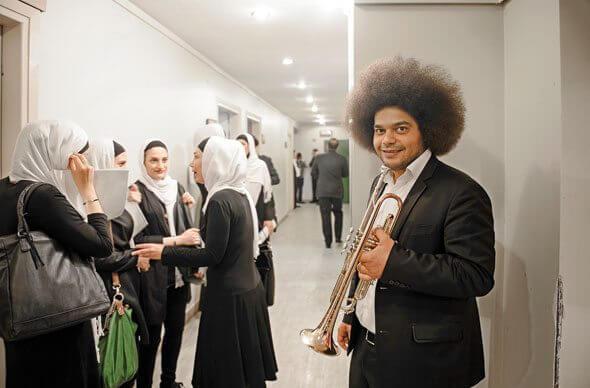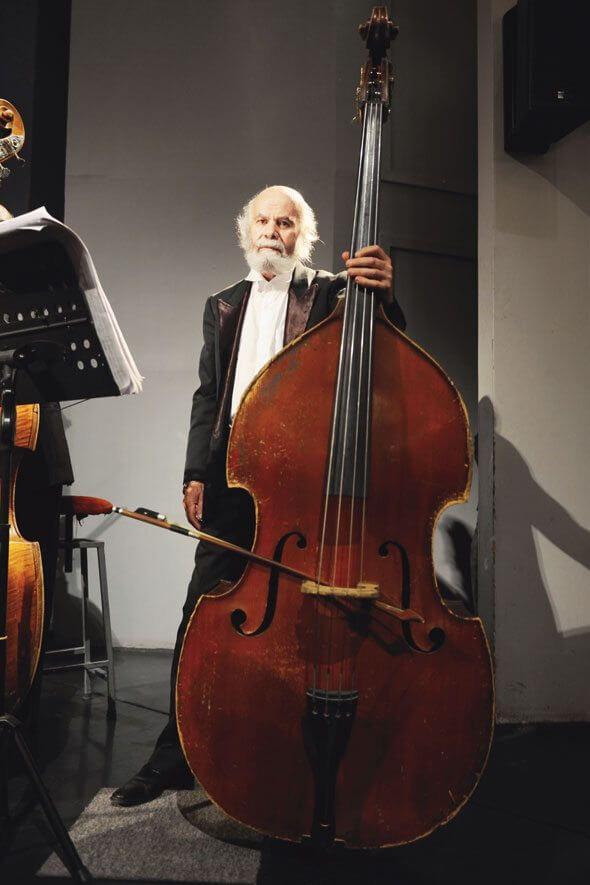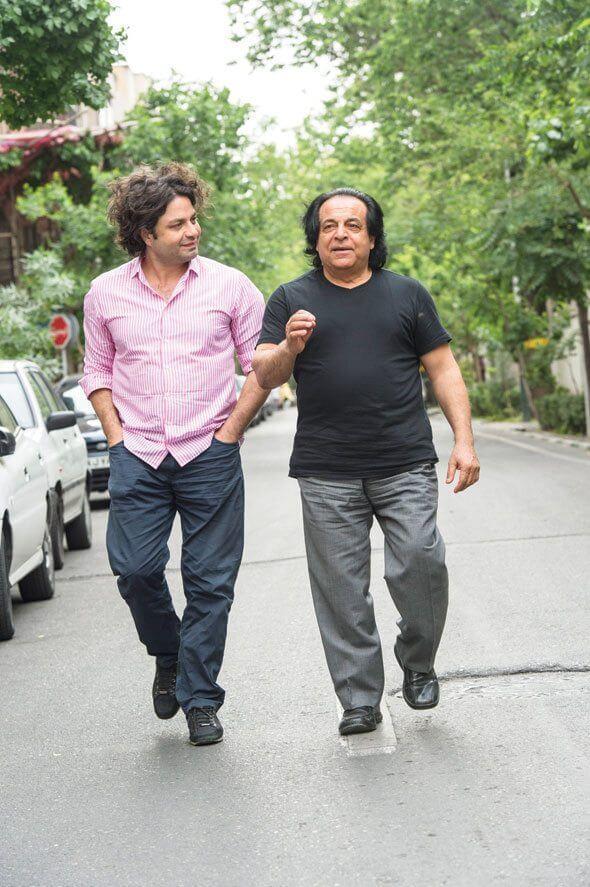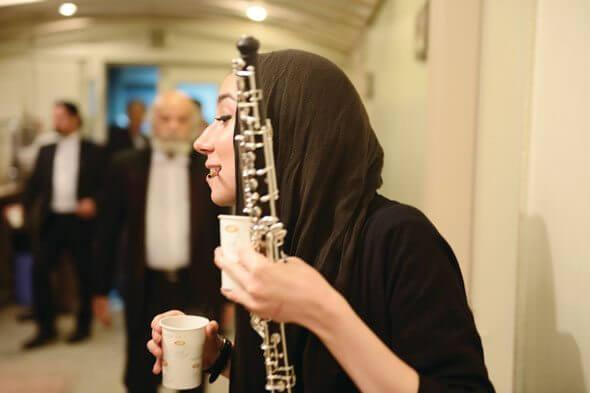The Iran nobody knows: Beethoven in Tehran
Report: Çınar Oskay Photos: Sebati Karakurt

The Vahdet Hall in Tehran is overcrowded for the symphony of symphonies, the peak of music. Beethoven was deaf when he finished his 9th Symphony, but the “Ode to Joy” went on to become the “anthem of humanity,” telling us that we are all brothers and sisters.
Maestro Alexander Rahbari, who recently returned to Iran after 40 years in exile, lifted his baton in the Vahdet Hall… The second violin and cellos softly rose with disordered sounds, like the warming-up process before the concert…
And then the concert started with thunder! The portrait of Ayatollah Khomeini hanging above, the headscarf-wearing choir on stage: The enthusiasm of the music shatters the venue and the time, integrating the stage with the world…
It is not surprising that the 9th Symphony has fascinated humanity for 200 years. We all recognize the feelings that inspired Beethoven to compose this work. Humanity is a whole with the East and the West. No pressure can demolish this spirit.
Rahbari was once the assistant of Herbert Von Karajan, and he has conducted the world’s best orchestra, the Berlin Philharmonic. He has now returned to a changing Iran after decades abroad.
Rahbari spoke to Hürriyet on the streets of Tehran after the concert.
I watched you as you were conducting the 9th Symphony yesterday. I couldn’t help looking at the Khomeini and Khamenei portraits above the stage. What do you think Beethoven would say if he saw this scene?
I think he would be proud because he would not expect it. I am very pleased that the Iranian president and the government support this work. We did not expect it at all. My mother is from a religious family, and she also liked music and culture. Last week I read in The Guardian that Iranian President Hassan Rouhani had established a Symphony Orchestra. This is very nice.
Did Rouhani really found this orchestra?
Of course. He called me about it.
Do you think it was a political step?
The BBC and CNN asked the same question! I said, “No, but I wish it was.” It is only Rouhani’s personal choice. Do you think founding or closing an orchestra in Turkey would affect election results? I don’t think so. But try to close the Berlin Philharmonic in Germany, then see what would happen! Football is more important than philharmonic orchestras in Turkey, but not in Germany. Germany attaches importance to both football and philharmonic orchestras. But in Austria, football falls quite far behind music. The Vienna Philharmonic comes before anything else. I hope someday it will be the same in our country. Because you can win or lose in football, but you never lose in music.
You came back to Iran in 2005 but did not stay.
The musicians’ life was desperate at the time. Their wages were miserable. Ahmadinejad was in power at that time. I felt they would not give me the support necessary to produce work at an international level.
When you played Beethoven’s 9th Symphony here back in 2005, they accused you of “adopting Western values.”
Newspapers reported it, but that was not the reason why I left. The reason was the wage of musicians.
How does the Islamic Republic look at Western music now?
It does not have a problem. We have had a symphony orchestra for 100 years. We had a symphony orchestra even at the time of Ahmadinejad. They did not support it yet did not close it. Nobody in this country was told “you cannot play Mozart, Wagner.” Iranian musicians, pop singers were the ones who suffered.”
Why?
Because they understood them. It is not that easy to understand Beethoven, Puccini, Verdi. You don’t criticize something that you don’t understand. Time has passed for them to ban something. Even in Turkey, Facebook and YouTube is closed but something else appears. For example, Fazıl Say. He is a very good musician, a matter of pride for Turkey. Let him criticize. So what? Nothing. I spent my life in Austria. They criticize anything. So what? Nothing.
‘They lied about the AKM’
You worked in Turkey, too.
I told my manager that I wanted to go to Turkey. “If you say, they will invite you,” he said. I worked for the Istanbul Symphony Orchestra, then in Ankara for 15-16 years and in Antalya for the last five years. Antalya is very good. A young and wonderful orchestra. It may be the best in Turkey in terms of discipline and working environment.
How often do you go to Turkey?
Eight times a year. I also go to Antalya five or six times. In fact, I work there like a music director and I am very happy.
You also played in the Atatürk Culture Center (AKM), right?
Of course I did. I made a speech. When they closed the AKM, they said they would open it in two years. I made an announcement: “I don’t believe you!” They did the same thing in Palermo. They said they would ropen it after two years but the work never ended. Your minister then said “Why does Rahbari talk like this? We will reopen it in two years.” I said, “No, that is a lie.” How many years have passed?
Seven years.
See? It was a lie.
What is the situation in Turkey and Iran in terms of music?
They are close. Turkish music impacts Iran. But you became close to Europe, developed faster. Adnan Saygun is excellent. Even Austria does not have a Saygun.
Really?
What is worrying is that 95 percent of Turks do not know that they have an older classical music tradition than the Dutch. Classical music has existed in Turkey for 200 years and in Iran, for 100 years. The Ottomans listened to Mozart; there was a symphony orchestra. Donizetti’s brother was a maestro. Of course they were in the palace. They became known thanks to Atatürk.
The most senior member of the orchestra
It seems both countries were behind closed doors in the palace.
It was the same in Austria and Germany. Remember, Mozart was buried in an unnamed grave. Iran and Turkey resemble each other. I want to bring a Turkish orchestra to Iran but they would have to wear headscarves. It causes difficulty. But you never know, maybe I will bring the Antalya Orchestra.”
Do you think Iran will have a universal democracy one day?
It does not work to carry one kind of system directly to another country. It should happen slowly. But it happens. Every child has a cellphone. Everyone has the Internet. Who would have believed it 10 years ago? Today our musicians are better than they were 30 years ago. Life is not black and white.
What makes you happy in returning to Tehran?
I am a musician; I love my job too much. Now we will go to Berlin and China. Barenboim will come here; he will play with us. Rouhani founded our orchestra at a time of the hardest international sanctions. This is why I respect him.
Why did he do that?
He is a person of culture; he respects musicians. Turkey has a budget and it does not have deal with sanctions. Rouhani did not have budget, but he opened it [the orchestra] with Beethoven’s 9th Symphony. I wrote an open letter to him from Vienna, saying, “You have the best orchestra in the region. You have excellent soloists and maestros.” I know he likes football very much. I said to him, “Please, give as much support to your symphony orchestra as you give to football. You have a successful career. Include the symphony orchestra in your successes.” It was a time when they wanted to close orchestras.
Years have taught you the ability to speak to politicians.
No, this was the best example! I hope that he will give support. Nobody expected it from Rouhani but he did. But it is expected from your president. There is a tradition of the past 200 years.
Çınar Oskay (L) and Alexander Rahbari in Tehran
'There is no alternative to Beethoven’
Why did you choose the 9th Symphony?
Because it is wonderful; its standard is so high and it is one of the most difficult works to perform. And its message is peace. The 9th Symphony does not have a nationality. You cannot say: “This is German music.” Shostakovich can be called political. What else can I play better than this? One of my friends asked me the same question. I said “I give you 10 minutes to offer me another work.”
You mean it does not have an alternative.
Zero! You cannot give “Carmina Burana.” They would say “What is going on?”
What is next? What will you do in Iran?
I have a contract for five years. They made me the music director of everything. Our new name is the Iranian National Symphony Orchestra. But we will also make national, contemporary music, along with opera and ballet, too.
Which opera?
Puccini’s Gianni Schicchi. It will be in Farsi.
Farsi? Is this a first?
Yes. It is for everyone to understand. It is a comic opera.
‘Karajan called, revolution happened’
How was the Iran of your childhood?
I was conducting a choir when I was 15. I went to the Vienna Academy when I was 17. I was invited to Tehran at the age of 24. I founded two orchestras. I left Iran three days before the revolution. In 1979, Herbert Von Karajan invited me to conduct the Berlin Philharmonic.
The Islamic Revolution occurred in your country in the year you conducted the world’s most important orchestra. How did you feel?
I was 30. It was very bad. Your career is rising but you don’t know what will happen in your country.
Did you isolate yourself from what was happening in Iran?
I was only watching the news. My family already moved to Austria 10 years before the revolution. Maestro von Karajan hired me as an assistant in Salzburg. Then the music directorship in Berlin for 12 years; afterwards, the Czech Philharmonic, Malaga, Zagreb, Belgrade. I conducted 120 orchestras, staged four operas and released 250 albums.
How was working with Karajan?
Extraordinary; he was the greatest maestro. We were together every day for two years. I learned how to record from him.
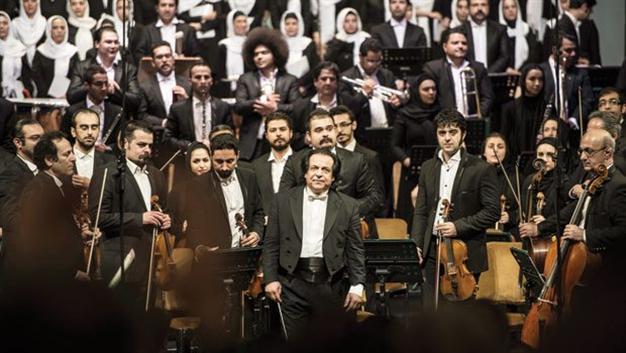 The Vahdet Hall in Tehran is overcrowded for the symphony of symphonies, the peak of music. Beethoven was deaf when he finished his 9th Symphony, but the “Ode to Joy” went on to become the “anthem of humanity,” telling us that we are all brothers and sisters.
The Vahdet Hall in Tehran is overcrowded for the symphony of symphonies, the peak of music. Beethoven was deaf when he finished his 9th Symphony, but the “Ode to Joy” went on to become the “anthem of humanity,” telling us that we are all brothers and sisters. 
